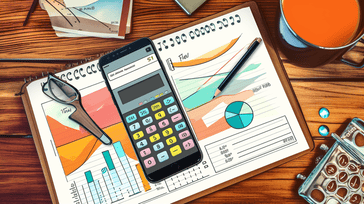
Welcome to our comprehensive guide on personal finance apps! In today's world, managing your finances effectively is more important than ever before. Personal finance apps offer valuable tools and resources that can assist with financial planning, budgeting, debt management, savings strategies, investment tips, retirement planning, and overall money management. By utilizing these apps, you can take control of your finances and work towards achieving your financial goals.
Whether you're just starting your financial journey or you're a seasoned investor, personal finance apps can help you make informed financial decisions and optimize your financial management. In this guide, we will explore the benefits of using personal finance apps, how to choose the right app for you, effective budgeting strategies, debt management tools and techniques, smart savings strategies, investment tips, retirement planning, enhancing financial literacy, and tools for overall money management.
Key Takeaways:
- Personal finance apps can help you effectively manage your finances.
- These apps offer tools for financial planning, budgeting, debt management, savings strategies, investment tips, retirement planning, and overall money management.
- Financial literacy is crucial in making informed financial decisions.
- Smart savings strategies and investment knowledge are important for long-term financial stability.
- Regular financial check-ups and evaluation are essential for maintaining financial wellness.
The Benefits of Using Personal Finance Apps
Managing your money can be a daunting task, but personal finance apps can make it easier to stay on top of your finances. With the help of these apps, you can effectively manage your money, set and achieve financial goals, track your expenses, and more. Let's take a closer look at some of the benefits of using personal finance apps.
Money Management Made Easy
Personal finance apps can help you stay organized and in control of your finances. By providing an overview of your financial situation, including your income, expenses, and savings, these apps give you a comprehensive view of your money. You can easily track your spending habits, identify areas where you can cut back, and plan for future expenses.
Sets and Achieves Financial Goals
Personal finance apps can help you set and achieve your financial goals. Whether you want to save money for a down payment on a house or pay off debt, these apps can help you create a plan to achieve those goals. By setting achievable goals and tracking your progress, you can stay motivated and focused on your financial objectives.
Financial Tracking
With the help of personal finance apps, you can easily track your expenses and monitor your financial progress. By providing real-time updates on your spending, these apps allow you to see where your money is going and make adjustments as needed. This can help you avoid overspending and ensure that you're staying within your budget.
Conclusion
Using personal finance apps can help you achieve financial wellness and gain control over your money. With their money management tools, goal-setting features, and financial tracking capabilities, these apps are a valuable resource for anyone looking to improve their financial situation. Download a personal finance app today and start taking control of your money!
Choosing the Right Personal Finance App for You

With the plethora of personal finance apps available, it can be overwhelming to decide which one is right for you. Consider the features that are most important to your financial management needs, including:
- Budgeting tools
- Investment tracking
- Bill payment reminders
- Debt management
- Expense tracking
- Savings goals and progress tracking
Some personal finance apps offer a combination of these features, while others focus on one or two areas. Do your research to determine which app aligns with your financial goals.
Personal Finance App Features
Here are some of the key features to consider when choosing a personal finance app:
| Feature | Description |
|---|---|
| Budgeting Tools | Apps offering budgeting tools can help you create a budget and track your spending against it. Some apps even allow you to customize your budget categories. |
| Investment Tracking | If you're looking to manage your investments through an app, look for features such as real-time market data, tracking performance, and diversification analysis. |
| Bill Payment Reminders | Some personal finance apps offer bill payment reminders, allowing you to easily stay on top of your upcoming payments and avoid late fees. |
| Debt Management | For those with significant debt, consider an app that provides debt management tools, such as debt payoff calculators, debt consolidation resources, and debt tracking features. |
| Expense Tracking | Apps with expense tracking features can help you monitor your spending, categorize expenses, and identify areas where you may be overspending. |
| Savings Goals and Progress Tracking | For those looking to save money, consider an app that allows you to set savings goals and track your progress towards them. |
Ultimately, the right personal finance app for you will depend on your individual financial management needs and goals. Take the time to research and compare different options to find the app that works best for you.
Effective Budgeting Strategies
Creating a budget is the foundation of successful money management. By tracking your income and expenses, you can gain a clear understanding of your financial situation and make informed decisions to reach your financial goals. Implementing effective budgeting strategies can help you take control of your finances and save money in the long run.
Budget Creation
The first step in budgeting is creating a budget. This involves identifying all sources of income and categorizing your expenses. Start by listing your monthly income, including salary, freelance work, or any other sources of income. Next, list all of your expenses, including fixed expenses like rent, utilities, and loan payments, as well as variable expenses like groceries, entertainment, and transportation.
| Category | Amount |
|---|---|
| Fixed Expenses | $2,000 |
| Variable Expenses | $1,500 |
| Total Expenses | $3,500 |
Expense Tracking
Tracking your expenses is crucial for effective budgeting. By monitoring where your money is going, you can identify areas where you may be overspending and make adjustments to your budget. There are many tools available to help with expense tracking, including personal finance apps like Mint or PocketGuard.
“Without tracking your expenses, it's impossible to know where your money is going.”
Saving Money
Implementing simple changes to your spending habits can help you save money over time. Consider cutting back on non-essential expenses, like eating out or shopping for unnecessary items. Look for ways to save on your fixed expenses, like renegotiating your internet or cable bill. Setting a specific savings goal can also help motivate you to save money each month.
- Cut back on non-essential expenses
- Save on fixed expenses
- Set a savings goal
Implementing effective budgeting strategies can help you take control of your finances and reach your financial goals. By creating a budget, tracking your expenses, and saving money, you can achieve financial stability and security.
Debt Management Tools and Techniques

Managing debt can be challenging, but personal finance apps can help make the process more manageable. Here are some debt management apps, debt consolidation options, and effective strategies for repaying debts:
Debt Management Apps
Debt management apps like Mint and YNAB (You Need A Budget) can help you keep track of your debts and create a repayment plan by analyzing your income, expenses, and debt. Such apps provide expert advice and recommendations for paying off debt quickly and efficiently.
Debt Consolidation Options
Debt consolidation is a process of combining multiple debts into a single, lower-interest loan. This can help make repayment more manageable by reducing the number of payments you need to make each month and lowering your overall interest rate. Some popular debt consolidation options include personal loans, balance transfer credit cards, and home equity loans.
Effective Strategies for Repaying Debts
- Snowball method: Start by paying off the smallest debt first and then move to the next smallest debt. As you continue paying off debts, you gain momentum, which helps maintain motivation.
- Avalanche method: Start by paying off the debt with the highest interest rate first. This method is more financially efficient; however, it may take longer to see progress and could be demotivating.
- Extra payments: Consider making extra payments on your debts each month. Even small additional payments can reduce the overall interest you pay and help you pay off your debts faster.
By utilizing debt management apps, considering debt consolidation options, and implementing effective debt repayment strategies, you can take control of your debts and work towards achieving financial freedom.
Smart Savings Strategies
Building financial security requires smart savings strategies that can help you save money for your various financial goals. Here are some tips to help you start:
- Set Savings Goals: Determine what you need to save for and set realistic goals for achieving them. This could be anything from saving for a down payment on a home to creating an emergency fund.
- Use Automatic Savings Apps: Consider using automatic savings apps like Digit or Qapital to help you save money without much effort. These apps automatically transfer small amounts of money from your checking account into a savings account.
- Create an Emergency Fund: Set aside some money specifically for emergencies. This can help you avoid going into debt in case of unexpected expenses.
- Establish Long-Term Savings Plans: Plan for your long-term financial goals, such as retirement, by putting aside a percentage of your income each month. Look into investment options that can help your money grow over time.
By implementing these savings strategies, you can make steady progress towards your financial goals and secure your future.
Investment Tips for Beginners

Investing your money can be a great way to grow your wealth over time. However, if you're new to investing, it can be overwhelming to know where to start. Fortunately, there are many investment apps available that can help simplify the process and make it more accessible.
One crucial factor to consider when investing is diversification. Diversification is the practice of investing in a variety of assets to spread out your risk. In other words, don't put all your eggs in one basket. By diversifying your investments, you can reduce the impact of any one asset performing poorly.
| Asset Type | Diversification Benefits |
|---|---|
| Stocks | Ownership in a company; potential for growth, but also higher risk |
| Bonds | Debt investment; lower risk, but lower potential return |
| Real Estate | Physical property investment; potential for income and appreciation |
| Commodities | Investment in physical goods like gold or oil; can provide diversification benefits but also come with higher risk |
Another important factor to consider is your risk tolerance. Your risk tolerance is the amount of risk you're comfortable taking on to potentially earn higher returns. Apps like Betterment and Wealthfront use questionnaires to determine your risk tolerance and recommend investment portfolios that align with your goals and comfort level.
Before investing, it's also important to set investment goals. Are you investing for short-term gains or long-term growth? Do you want to invest in specific companies or industries? Apps like Robinhood and E*TRADE offer commission-free trading and allow you to buy and sell individual stocks and ETFs, giving you more control over your investments.
Overall, investment apps can be a helpful tool for beginners looking to enter the world of investing. Just remember to diversify your investments, consider your risk tolerance, and set clear investment goals. With time and patience, you can see your money grow through smart investments.
Planning for Retirement
Planning for retirement is a crucial step in securing long-term financial stability. Retirement planning involves setting goals, calculating savings needs, and determining income sources. Retirement planning apps can be useful tools in this process. These apps provide personalized retirement planning guidance, help calculate retirement savings needs, and offer suggestions for investment strategies.
Retirement savings should be a top financial priority. The earlier you start saving, the more time your savings will have to grow. It is recommended to save at least 15% of your income for retirement. One effective retirement savings strategy is to participate in a pension plan. A pension plan is a retirement account that is sponsored by an employer. Pension plans can provide a guaranteed source of retirement income and are often complemented by individual retirement accounts (IRAs) or 401(k) plans.
Social Security benefits are another potential source of retirement income. Social Security provides a monthly check to eligible retirees. The amount of the benefit is based on your earnings history, with higher earners typically receiving a larger benefit. Retirement planning apps can help estimate your Social Security benefit and incorporate it into your overall retirement income plan.
Retirement Savings by Age
The table below outlines retirement savings benchmarks by age, as recommended by industry experts:
| Age Range | Retirement Savings |
|---|---|
| 25-35 | 1x annual salary |
| 35-45 | 2x annual salary |
| 45-55 | 4x-5x annual salary |
| 55-65 | 6x-8x annual salary |
Remember that retirement planning is a lifelong process that requires regular evaluation and adjustments. Utilizing retirement planning apps, actively participating in pension plans, and saving regularly can help you achieve financial security in retirement.
Enhancing Financial Literacy
Financial literacy is a vital aspect of effectively managing your money. By gaining a better understanding of personal finance resources and key financial terms, you can make informed financial decisions that align with your goals. Here are some tips for enhancing your financial literacy.
Explore Financial Education Programs
One of the best ways to enhance your financial literacy is by participating in financial education programs. Many organizations offer financial education courses that cover a wide range of personal finance topics. These courses can help you gain a better understanding of financial concepts, such as investment strategies or retirement planning.
Utilize Personal Finance Resources
There are many personal finance resources available to help you learn about managing your money. From financial blogs to podcasts, these resources can offer valuable insights and advice on a wide range of topics, from budgeting to debt management. Consider exploring these resources to expand your financial knowledge.
Understand Key Financial Terms
Understanding key financial terms is crucial in making informed financial decisions. Take the time to research and learn common financial terms, such as APR, stocks, or bonds. By gaining a better understanding of these terms, you can better comprehend financial documents and effectively manage your money.
Tools for Money Management
In today's fast-paced world, keeping track of your finances can be challenging. Thankfully, there are several personal finance tools available that can assist with overall money management, including:
- Personal finance calculators: These calculators can help you figure out everything from debt repayment schedules to retirement savings plans.
- Expense trackers: Apps such as Mint and PocketGuard can help you keep track of your daily expenses and provide insights into your spending habits.
- Net worth trackers: Tracking your net worth over time can provide valuable insights into your overall financial health. Apps such as Personal Capital can help you easily monitor your net worth and investment portfolio performance.
By utilizing these tools, you can gain better control over your finances and make informed financial decisions.
Maintaining Financial Wellness
Financial wellness is essential for a stress-free life. It requires consistent effort and attention to ensure that your finances are in good shape. To maintain financial wellness, it is crucial to conduct regular financial check-ups and assess your financial goals.
The Importance of Regular Financial Check-Ups
Regular financial check-ups involve evaluating your overall financial situation, including income, expenses, debts, and savings. By conducting regular financial check-ups, you can identify any potential issues and take corrective action before they become significant problems. It is recommended to conduct a financial review at least once a year, or more frequently if you experience significant changes in your financial situation, such as a new job, a significant purchase, or a change in income.
During a financial review, you should evaluate the following areas:
| Area | Action |
|---|---|
| Income | Review your income sources and assess if they are sufficient to cover your expenses and savings goals. |
| Expenses | Review your expenses and identify areas where you can reduce costs or eliminate unnecessary expenses. |
| Debts | Review your debt balances and interest rates. Develop a plan to pay off your debts as soon as possible, starting with high-interest debts first. |
| Savings | Review your savings goals and assess if you are on track to achieve them. Adjust your savings plan if necessary. |
Assessing Your Financial Goals
Assessing your financial goals is an essential part of maintaining financial wellness. Goals give you a sense of direction and purpose, providing a clear roadmap for achieving financial success. To assess your financial goals, consider the following:
- Review your current financial goals and assess your progress towards achieving them.
- If you have achieved your goals, set new goals that align with your current financial situation and priorities.
- If you have not made progress towards your goals, identify any obstacles and develop a plan to overcome them.
- Regularly track your progress towards your goals and adjust your plan as needed.
By conducting regular financial check-ups and assessing your financial goals, you can maintain financial wellness and achieve financial success. Remember to prioritize your finances and make informed decisions to reach your financial dreams.
Conclusion
Managing your money effectively can be a daunting task, but personal finance apps offer a wide range of tools to help you achieve your financial goals. By implementing budgeting strategies and using debt management tools, you can optimize your spending and saving habits and build a secure financial future.
Investment apps, retirement planning tools, and personal finance calculators can also provide valuable insights and guidance. However, it's important to prioritize financial literacy and continually assess and adjust your financial goals to maintain financial wellness.
Remember to Stay Committed
Staying committed to your personal finance goals can be challenging, but it's crucial for long-term success. Regular financial check-ups and evaluations can help you stay on track and make adjustments when necessary. Remember to utilize the various resources available to you, such as personal finance resources and key financial terms, to enhance your financial literacy and make informed financial decisions.
Overall, personal finance apps offer valuable tools for managing your money effectively. By utilizing these resources and staying committed to your financial goals, you can achieve financial well-being and realize your financial dreams.
FAQ
What are personal finance apps?
Personal finance apps are tools designed to help individuals effectively manage their money. They can assist with financial planning, budgeting, debt management, savings strategies, investment tips, retirement planning, and overall money management.
What are the benefits of using personal finance apps?
Personal finance apps have several advantages. They can help you set and achieve financial goals, track your expenses, and effectively manage your finances.
How do I choose the right personal finance app?
When selecting a personal finance app, consider features such as budgeting tools, investment tracking capabilities, and other functionalities that align with your financial management needs.
What are some effective budgeting strategies?
Effective budgeting strategies include creating and maintaining a budget, tracking expenses, and saving money.
Are there tools to help with debt management?
Yes, there are debt management apps, debt consolidation options, and effective strategies for repaying debts.
How can I develop smart savings strategies?
Smart savings strategies involve setting savings goals, utilizing automatic savings apps, creating emergency funds, and establishing long-term savings plans.
What investment tips can you provide for beginners?
Beginners can benefit from using investment apps, understanding diversification, assessing risk tolerance, and setting investment goals.
How do I plan for retirement?
Retirement planning involves using retirement planning apps, implementing retirement savings strategies, understanding pension plans, and evaluating social security benefits.
How can I enhance my financial literacy?
Enhancing financial literacy involves accessing personal finance resources and understanding key financial terms.
What tools can assist with money management?
Various tools, such as personal finance calculators, expense trackers, and net worth trackers, can help with overall money management.
How can I maintain financial wellness?
Maintaining financial wellness requires regular financial check-ups and assessing and adjusting financial goals accordingly.







